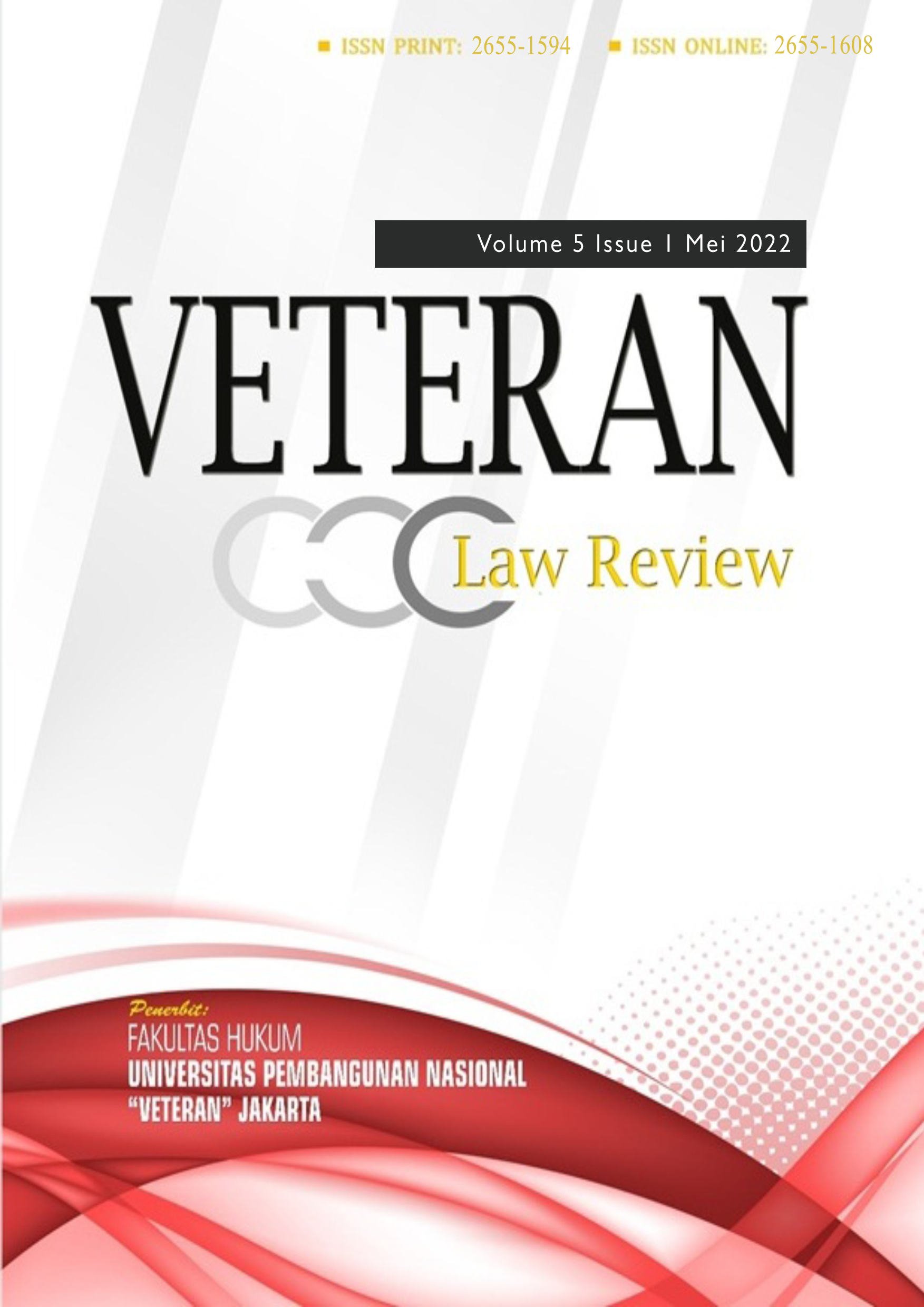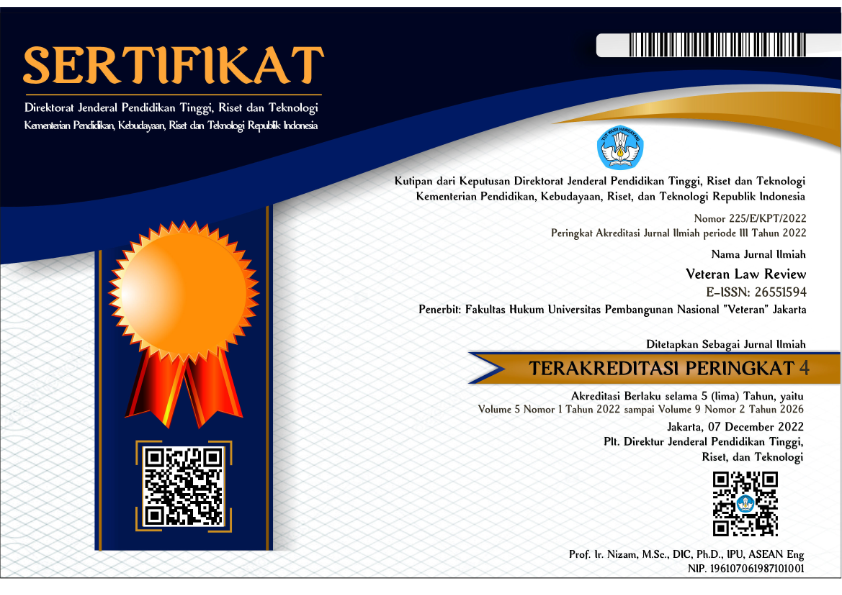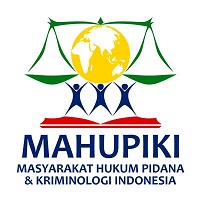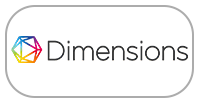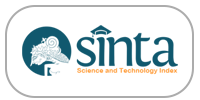Credit Agreement Due To The Corona-19 Pandemic (Study of Wonosari District Court Decision Number 3/Pdt.G.S/2020)
DOI:
https://doi.org/10.35586/velrev.v5i1.2836Abstract
The corona pandemic as a delay in credit payments, the determination of the non-natural disaster Covid-19 as a national disaster through Presidential Decree 12/2020 does not automatically become the basis for parties in commercial agreements to declare themselves in a state of force majeure. In-depth study of case by case analysis by paying attention to the clauses in an agreement becomes the benchmark for determining the state of force majeure. As a result of parties who did not fulfill their achievements in the credit agreement during the Covid-19 period. The suspension of liability occurs when a force majeure event is temporary. When the condition of the obstacle has recovered, for example the export ban is lifted again, then the obligation of the seller returns to recover to hand over the exported goods. Agreement resulting from the corona 19 pandemic in the perspective of presidential decree no. 12 of 2020 concerning the determination of non-natural disasters (Wonosari State Court Decision Study Number 3 / Pdt.G.S / 2020) in agreements usually also regulates the consequences of a force majeure event, for example whether to postpone an agreement or can be used as a condition for canceling an agreementDownloads
References
Books:
Adityo Susilo. (2020). Coronavirus Disease 2019: Tinjauan Literatur Terkini. Jurnal Penyakit Dalam Indonesia. 7 (1)
No Soekanto dan Sri Mamudji. (2003). Penelitian Hukum Normatif, Suatu Tinjauan Singkat. Cetakan Keenam. Jakarta: RadaGrafindo Persada.
Peni Jati Setyowat. (2021). Akibat Hukum Pandemi Covid-19 sebagai Bencana Alam Non Medis dalam Menetapkan Force Majeure di Indonesia. Fakultas Hukum Universitas Muhammadiyah Purwokerto. 21 (1).
Journals:
Ahmad Fauzi & Ismail Koto. (2021). Tanggung Jawab Pelaku Usaha terhadap Konsumen Terkait dengan Produk Cacat. Journal of Education, Humaniora and Social Sciences (JEHSS) ISSN2622-3740 (Online) Vol 4, No. 3. PP. 1495
Dona Budi Kharismai. (2020). Pandemi Covid-19 Apakah Force Majeure?. Jurnal Media Pembinaan Hukum Nasional. 1 (1).
Erwin Asmadi dk. (2021). Efektivitas Pemanfaatan Teknologi Informasi Dalam Persidangan Perkara Pidana Selama Pandemi Covid-19. DE LEGA LATA: Jurnal Ilmu Hukum Volume 6 Nomor 2 PP. 468
Ismail Koto, Erwin Asmadi. (2021). Pertanggungjawaban Hukum Terhadap Tindakan Malpraktik Tenaga Medis di Rumah Sakit. Vol. 4 No. 2
Negara, N.P., Udiana, I.M., & Pujawan, I.M. (2013). Perlindungan Nasabah Perbankan Melalui Otoritas Jasa Keuangan. Kertha Semaya. 1 (11).
Putra, I.W., Dharmakusuma, A.A., & Kasih, D.P. (2018). Peranan Otoritas Jasa Keuangan Dalam Mengawasi Lembaga Keuangan Non Bank Berkaitan Dengan Sektor Asuransi Di Bali. Kertha Semaya. 6 (3).
Putu Bagus Tutuan Aris Kaya. (2020). Kajian Force Majeure Terkait Pemenuhan Prestasi Perjanjian Komersial Pasca Penetapan Covid-19 Sebagai Bencana Nasional. Jurnal Kertha Semaya. 8 (6).
Riza Fibriani. (2020). Kebijakan Hukum Pembatalan Kontrak Dalam Keadaan Force Majeure Pandemi Covid-19 Di Indonesia. 10 (2).
Taufik Hidayat Lubis, Ismail Koto, (2020). Diskursus Kebenaran Berita Berdasarkan Undang-Undang Nomor 40 Tahun 1999 Tentang Pers Dan Kode Etik Jurnalistik DE LEGA LATA: Jurnal Ilmu Hukum Volume 5 Nomor 2 PP. 234
Downloads
Published
How to Cite
Issue
Section
License
Copyright (c) 2022 Veteran Law Review Journal
Veteran Law Review © 2022 by Faculty of Law Universitas Pembangunan Nasional "Veteran" Jakarta is licensed under Creative Commons Attribution 4.0 International

1. License
The non-commercial use of the article will be governed by the Creative Commons Attribution license as currently displayed on Creative Commons Attribution 4.0 International.
2. Author(s)' Warranties
The author warrants that the article is original, written by the stated author(s), has not been published before, contains no unlawful statements, does not infringe the rights of others, is subject to copyright that is vested exclusively in the author, and free of any third party rights, and that any necessary written permissions to quote from other sources have been obtained by the author(s).
3. User/Public Rights
VELREV's spirit is to disseminate articles published are as free as possible. Under the Creative Commons Attribution-ShareAlike 4.0 International License. VELREV permits users to copy, distribute, display, and perform the work for non-commercial purposes only. Users will also need to attribute authors and VELREV to distributing works in the journal and other media of publications.
4. Rights of Authors
Authors retain all their rights to the published works, such as (but not limited to) the following rights;
- Reproduce the work
- Prepare derivative works based upon the work
- Distribute copies of the work
- Perform the work publicly
- Display the work publicly
- Copyright and other proprietary rights relating to the article, such as patent rights,
- The right to self-archive the article,
- The right to enter into separate, additional contractual arrangements for the non-exclusive distribution of the article's published version (e.g., post it to an institutional repository or publish it in a book), with an acknowledgement of its initial publication in this journal (Veteran Law Review).
5. Co-Authorship
If the article was jointly prepared by more than one author, any author submitting the manuscript warrants that he/she has been authorized by all co-authors to be agreed on this copyright and license notice (agreement) on their behalf, and agrees to inform his/her co-authors of the terms of this policy. VELREV will not be held liable for anything that may arise due to the author's internal dispute. VELREV will only communicate with the corresponding author.
6. Royalties
Being an open accessed journal and disseminating articles for free under the Creative Commons license term mentioned, author(s) are aware that VELREV entitles the author(s) to no royalties or other fees.
7. Miscellaneous
VELREV will publish the article (or have it published) in the journal if the article’s editorial process is successfully completed. JOSI's editors may modify the article to a style of punctuation, spelling, capitalization, referencing, and usage that deems appropriate. The author acknowledges that the article may be published so that it will be publicly accessible and such access will be free of charge for the readers as mentioned in point 3.

